|
|
|
Sort Order |
|
|
|
Items / Page
|
|
|
|
|
|
|
| Srl | Item |
| 1 |
ID:
136579


|
|
|
|
|
| Summary/Abstract |
The article examines the reasons behind the Aquino administration’s instantaneous
support for the Obama administration’s pivot to Asia as the Philippines negotiated
and signed a framework agreement on enhanced defense cooperation with the United States. This outright backing stems from President Aquino’s determination to counter China’s expansionism in the South China Sea. The 2012 Scarborough Shoal stand-off between the Philippines and China has validated the immediacy of this security arrangement which jibes with the U.S. strategic policy. In conclusion, the article contends that a small power like the Philippines—when confronted by an emergent and potentially expansionist power—is not necessarily helpless since it has foreign policy choices, as well as the power to chart its own destiny.
|
|
|
|
|
|
|
|
|
|
|
|
|
|
|
|
| 2 |
ID:
136700


|
|
|
|
|
| Summary/Abstract |
Australia should not embrace America, writes its former prime minister, but preserve itself from Washington’s reckless overreach.
|
|
|
|
|
|
|
|
|
|
|
|
|
|
|
|
| 3 |
ID:
136333


|
|
|
|
|
| Summary/Abstract |
The idea of pacifism dates back to the comprehensive social reforms that were introduced after Japan’s surrender in World War II. The U.S.-led occupying forces carried out a series of democratization and demilitarization policies in a bid to establish a government that would respect other countries and embrace the UN Charter. The U.S. wanted a Japan that would no longer pose a threat to them and to international peace and security. Those policies soon led to a breakdown of Japan’s old systems. In contrast to militarism during the pre-war period, Japan’s U.S.-led social reforms were peaceful. With the gradual evolution of policy adjustments, Japan gradually achieved rapid economic growth and regained recognition from the international community. It apologized for its war-time aggression. Pacifism was widely accepted by the Japanese people and it laid a foundation for Japan’s peaceful development. And so pacifism became part of the Japanese society’s system of values.
|
|
|
|
|
|
|
|
|
|
|
|
|
|
|
|
| 4 |
ID:
136910


|
|
|
|
|
| Summary/Abstract |
The author looks at the prospects for an active global defence (AGD) to be developed in Russia as a counterweight to the US prompt global strike concept, the role and place of the Land Forces, antiaircraft units in the AGD system, and they key criteria the antiaircraft system has to meet to be effecting in protecting troops and facilities
|
|
|
|
|
|
|
|
|
|
|
|
|
|
|
|
| 5 |
ID:
134980
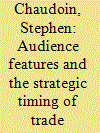

|
|
|
|
|
| Summary/Abstract |
If international institutions are such potent alarm mechanisms that mobilize procompliance domestic audiences, as many existing theories argue, why do countries wait so long before sounding the alarm? World Trade Organization (WTO) members often wait months or even years before objecting to their trading partners’ WTO-illegal barriers. To turn a phrase, trade cooperation delayed is trade cooperation denied, so why wait? To explain this variation, I develop a theory of institutional alarm mechanisms in which (1) the preferences and strength of the audience hearing the alarm vary and (2) the decision to sound the alarm is strategic. Sounding the alarm is most valuable when strong audiences in the defendant country support compliance. I test this prediction using competing risks models analyzing the timing of WTO disputes against US tariff barriers. Consistent with the theory, disputes are more likely during election years when macroeconomic indicators suggest broader support for free trade.
|
|
|
|
|
|
|
|
|
|
|
|
|
|
|
|
| 6 |
ID:
137400


|
|
|
|
|
| Summary/Abstract |
A basic trade-off in military cooperation exists: States must respond to the dominant ally’s demands and act as a reliable partner while simultaneously making a decision that is acceptable to domestic audiences. We argue that compensatory burden-sharing strategies are imperfect but dependable solutions to manage foreign policy decisions at the domestic and alliance levels. Our theoretical expectations are tested using the US-Japan and US-Republic of Korea alliances and, in particular, the contribution of each country to the war in Afghanistan. We find that foreign aid commitments to third parties are made as a form of compensation when alliance expectations are substantial, but the secondary ally's ability to contribute militarily is highly constrained. Foreign aid has therefore served as an alliance management tool.
|
|
|
|
|
|
|
|
|
|
|
|
|
|
|
|
| 7 |
ID:
134752


|
|
|
|
|
| Summary/Abstract |
British geostrategic considerations underwent an ad hoc metamorphosis during the decade following Great Britain’s retreat from formal territorial empire (1957-67). This essay investigates the shifting roles envisioned by British policymakers for vestigial colonial holdings in the Arabian Peninsula, specifically the Colony of Aden and Protectorate of Aden. Throughout the decade in question, policies regarding the burgeoning Cold War, the decline of formal empire, and Britain’s role in the world as an independent power and key partner of the United States became differentiated from initial postwar positions. Aden played a vital role in this decision making while providing a rough proxy of larger geopolitical trends.
|
|
|
|
|
|
|
|
|
|
|
|
|
|
|
|
| 8 |
ID:
136161
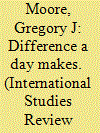

|
|
|
|
|
| Summary/Abstract |
Late on June 3, 1989, and into the next day Chinese soldiers brought to an abrupt end the 7-week standoff between the Chinese state and students and citizens of Beijing. It has been common to see balance of power considerations as bringing China and the United States together in 1972 to balance against the Soviet Union, and it has been equally common to see the end of what Kissinger called the Sino-American “tacit alliance” (1972–1989) to be, naturally, the end of the Cold War and/or the breakup of the Soviet Union. Borrowing from Hopf's societal constructivism (2012) and Wendt's “cultures of anarchy” (1999) here applied at the second level of analysis, the following study concludes that June 4 was actually key to the end of the Sino-American “tacit alliance,” leading to a major shift in mutual perceptions, which caused a shift in the Sino-American dyadic culture, from that of trusted friends to that of distrusted adversaries for a season, effectively ending the “tacit alliance” between the US and China.
|
|
|
|
|
|
|
|
|
|
|
|
|
|
|
|
| 9 |
ID:
134582


|
|
|
|
|
| Summary/Abstract |
The drift and incoherence of U.S. foreign policy under the Obama administration has not gone unnoticed in the Arab world and the Middle East, especially among America's Arab Gulf allies. Former U.S. Ambassador to Saudi Arabia Chas Freeman could have been channeling Gulf elites when he said: “Americans no longer command the ability to shape trends in the Middle East. Almost no one expects us to do so.”1 The United States and its strategic allies in the Gulf have increasingly divergent visions of how regional politics should operate. The “marriage” between Washington and the Gulf has been long and beneficial to both sides, though not without its ups and downs. Neither side really wants a divorce, but Gulf elites increasingly worry that this episode of tensions is qualitatively different from those that came before. They fear that, this time, Washington not only disagrees with their view of the region, it does not care about their opinions, because America's strategic commitment to the Gulf, and the Middle East more generally, is no longer solid. For them, the “pivot to Asia” looks increasingly like a retreat from the Middle East. The renewed talk in American policy circles about “energy independence,” this time with more credible evidence to back it up, just adds to Gulf worries that Washington has downgraded the Gulf region and that the pivot is really a retreat.
|
|
|
|
|
|
|
|
|
|
|
|
|
|
|
|
| 10 |
ID:
135581
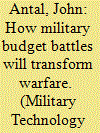

|
|
|
|
|
| Summary/Abstract |
In the 21st century a modernized military force and waging war is expensive. As wars engulf the Middle East, Africa and the Ukraine – to mentions a few hotspots- military budgets in the US and many other nations are slashed as their economies can no longer sustain previously high expensive levels. something but, what? How? has to change.
|
|
|
|
|
|
|
|
|
|
|
|
|
|
|
|
| 11 |
ID:
134649


|
|
|
|
|
| Summary/Abstract |
Nuclear weapons are uniquely capable of threatening entire countries’ existences, but not all nuclear weapons possessors are equally capable of posing such threats. This article explores the existential threats that nuclear weapons possessors pose with a new, empirically based metric called the Nuclear Annihilation Threat (NAT) Index. Using the NAT Index, we comparatively analyze the existential threats and vulnerabilities that nuclear-armed states face from one another. In particular, we apply these insights to gain a better understanding of the nuclear security threats and vulnerabilities of the United States and Israel and explore the implications of Iran going nuclear for both countries.
|
|
|
|
|
|
|
|
|
|
|
|
|
|
|
|
| 12 |
ID:
135363
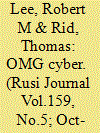

|
|
|
|
|
| Summary/Abstract |
For many austerity-hit Western countries, the defence budget has been a prime target for significant cuts. Nowhere has this been more apparent than in the United States. Yet one element of the Pentagon's budget continues to grow: cyber. High-profile security breaches at the corporate level and reports of cyber-espionage at the national level seemingly justify the vast sums involved in ensuring cyber-security. However, Robert M Lee and Thomas Rid argue that ‘cyber-angst’ is damaging – and self-serving. In this article, they list thirteen reasons why such cyber-security hype is counterproductive.
|
|
|
|
|
|
|
|
|
|
|
|
|
|
|
|
| 13 |
ID:
136589


|
|
|
|
|
| Summary/Abstract |
Contemporary security scenario in Afghanistan appears remote from achieving peace, security and stability in a country that has had been experiencing decades-long armed conflict, insurgency, extremism, terrorism and violence of all kinds. Lately, incidences of armed conflicts, insurgent and terrorist activities are on the rise leading to increased casualties and deaths of the civilians. Principal factors responsible for undermining security and stability in Afghanistan include, but not limited to the continuing insurgency by the Taliban fighters and the terrorism perpetrated by various militant armed groups based both in Afghanistan and across the border. The United States-led International Security Assistance Force, a multinational stabilisation force, on the other hand, is responsible to provide security and stability in Afghanistan since its deployment in 2001. After thirteen years of prolonged counter insurgency and counter terrorism efforts of the ISAF, Taliban insurgency is still showing remarkable strength and little sign of receding shortly making prospects for peace and security in Afghanistan very much obscure. After reviewing the recent security situation in Afghanistan, questions can be raised as to the roles of ISAF in Afghanistan and what are the impacts of their initiatives as insurgency and terrorism continue to bleed the country. The paper argues that lack of success on the part of ISAF in achieving its objectives in Afghanistan is explicitly evident given the rising state of insecurity and instability in recent times. The paper, however, also discusses the various challenges confronted by ISAF in continuing its operations in Afghanistan. At the end, the analysis exhibits some ways forward in achieving peace and security in Afghanistan and establishing sustainable democratic governance in the country.
|
|
|
|
|
|
|
|
|
|
|
|
|
|
|
|
| 14 |
ID:
136627


|
|
|
|
|
| Summary/Abstract |
Foreign policy experts have struggled to describe the unusual character of contemporary world politics. Much of the debate revolves around the concept of polarity, which deals with how power is distributed among nations, as experts ask if the United States is still a unipolar power or in decline as new powers emerge.1 The polarity debate, however, obscures more than it clarifies because the distribution of power does not determine the fate of nations by itself. It leaves out strategic choice and does not predict how the United States would exercise its power or how others would respond to U.S. primacy. World politics can take many paths, not just one, under any particular distribution of power. The most remarkable feature of post-Cold War world politics has not been the much-discussed power accumulation of the United States—although that is indeed noteworthy—but rather the absence of counter-balancing and revisionist behavior by other major powers.
|
|
|
|
|
|
|
|
|
|
|
|
|
|
|
|
| 15 |
ID:
134495
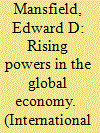

|
|
|
|
|
| Summary/Abstract |
Over the past 20 years, social scientists, government officials, and investors have expressed mounting interest in the BRIC countries, which include Brazil, Russia, India, and China.2 This acronym was originally coined in 2001 by a Goldman Sachs official who was concerned with the increasing role these countries were playing in global finance (Hounshell 2011). Recently, there has been a growing recognition that the effects of the BRICs on the global economy are not limited to finance. It is also clear that these countries are key political actors: all but one of them possess nuclear weapons, they are regional powers, and many observers view China as a potential challenger to the United States in global political-military affairs.
|
|
|
|
|
|
|
|
|
|
|
|
|
|
|
|
| 16 |
ID:
136815


|
|
|
|
|
| Summary/Abstract |
The Persian Gulf region has 63 percent of OIL and 39 percent of gas reserves globally. 45 percent of OECD oil is from the Gulf and the USA imports 60 percent from the Gulf. In 2003 oil exports from Gulf were 705 million tones. Oil production/ reserves outside Gulf are declining. At current rates of production, Gulf oil is likely to last at least for the next 50 years. Besides the Gulf region, the entire West Asia and North Africa also has substantial oil and gas resources. Due to this, the region has become the focus of attention especially of the USA. Oil was an important reason for US invasion of Iraq, in view of mounting threats from Al Qaeda in Saudi Arabia. This has led to growth of religious groups which are opposing regimes allied to West especially in the GCC, using terrorism to destroy oil facilities. The unresolved Arab-Israeli conflict and continued Palestinian sufferings has further aggravated this issue. Escalating US-Israeli threats to Iran, disintegration of Somalia, uncertainty in Yemen so on has led to growing maritime security threats. Thus, lack of democracy and related instability, religious extremism, terrorism, sectarianism, border disputes, human rights violations, besides the above reasons are the emerging threats. India imports over 70 % of oil needs and bulk of it comes from Gulf. There are nearly 5 million Indians in GCC states working and sending over $20 billion as remittances, Indo-GCC TRADE is of the order over $100 billion and from investment point of view GCC is important. At the same time, India has been affected by the oil shocks—at least six times in the last 35 years. The paper apart from highlighting the above issues will also discuss what measures need to be adopted to ensure India’s energy security.
|
|
|
|
|
|
|
|
|
|
|
|
|
|
|
|
| 17 |
ID:
135562


|
|
|
|
|
| Summary/Abstract |
The USMC has relied on its unwavering US congressional financial support through most of the post-WWII era. The nation’s and Pentagon’s fiscal realities – and the cost of new weapons platforms – are among the service’s challenges to funding its future requirements
|
|
|
|
|
|
|
|
|
|
|
|
|
|
|
|
|
|
|
|
|